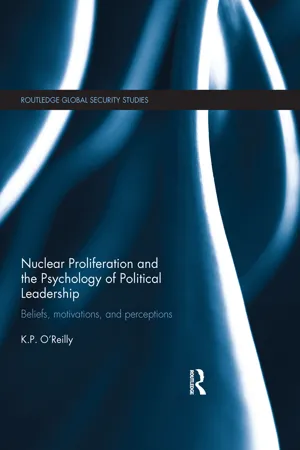
- 236 pages
- English
- ePUB (mobile friendly)
- Available on iOS & Android
Nuclear Proliferation and the Psychology of Political Leadership
About This Book
This book offers a novel approach to understanding the puzzle of nuclear proliferation by examining how leaders' beliefs and perceptions about the international system influence states' decisions to acquire nuclear weapons.
Today, there is a persisting dilemma over the spread of nuclear weapons for both practitioners and scholars of international affairs. Uncertainty remains whether determined proliferators can be stopped, as shown by the cases of North Korea and Iran. These instances of proliferation raise questions about regional stability, the use of pre-emptive military action, and the potential for reactive-proliferation by neighbouring countries. Despite the serious implications surrounding the spread of these weapons, proliferation scholarship has thus far failed to solve what has been described as the "proliferation puzzle"- why do some countries choose nuclear weapons while others do not?
The author argues that understanding basic psychological motivations, such as the role of power and perceptions of self and others, forms a strategic context which provides answers about a leader's willingness to proliferate. Proliferation willingness is a critical, yet frequently overlooked, part of the proliferation equation. Ultimately, it is the combination of willingness and proliferation opportunity (i.e. technical and scientific capabilities) that determines whether a country 'goes nuclear'. By examining several historical instances of proliferation decision-making—in South Africa, India, Libya and Australia—the book's findings highlight the fundamental role of leaders' beliefs in shaping proliferation outcomes.
This book will be of much interest to students of nuclear proliferation, political psychology, security studies and IR in general.
Frequently asked questions
Information
Table of contents
- Cover
- Half Title
- Title Page
- Copyright Page
- Table of Contents
- List of figures
- List of tables
- Acknowledgments
- List of abbreviations
- 1 The persisting proliferation dilemma
- 2 Analyzing nuclear proliferation decisions
- 3 South Africa: the apartheid bomb
- 4 India: crossing the Lakshmana Rekha
- 5 Australia: waltzing with atomic Matilda
- 6 Libya: a rogue redeemed?
- 7 Conclusions: perceptions on proliferation
- Index